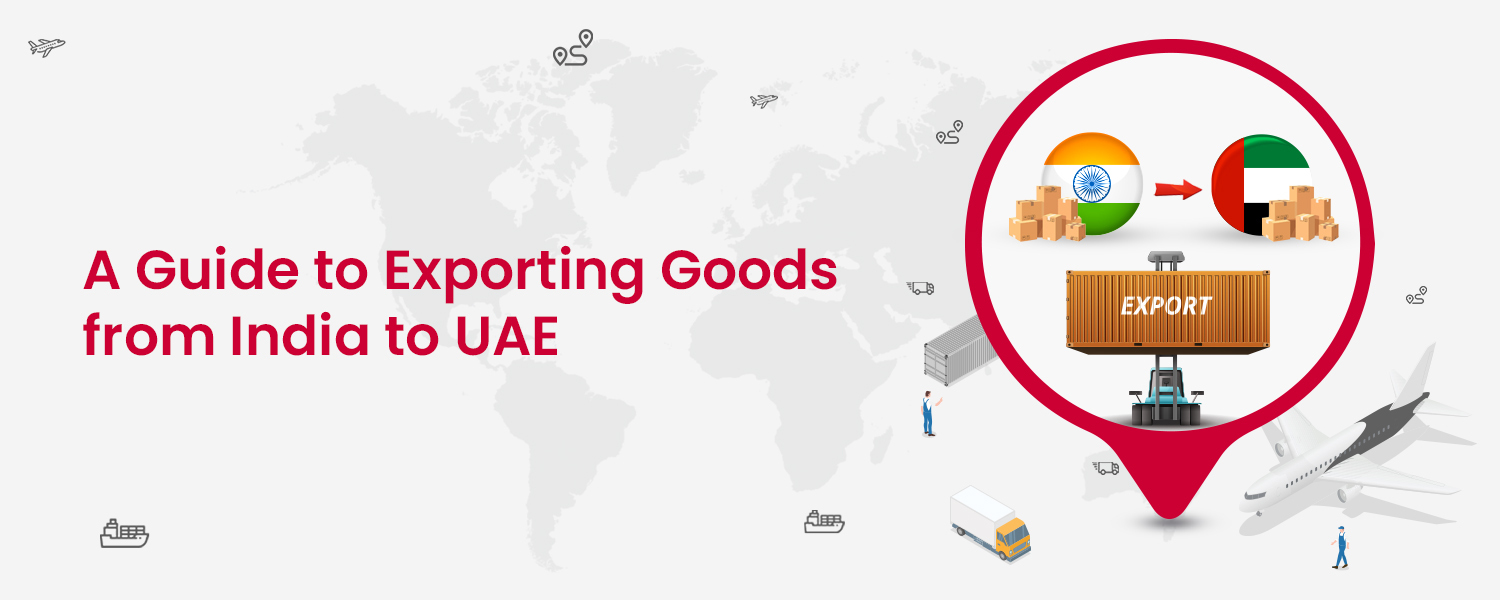Are you an entrepreneur in India, eyeing the golden sands of the United Arab Emirates (UAE) as your next business frontier? With bilateral trade expected to reach a staggering $100 billion by 2030, the business corridor between India and the UAE is booming.
But while the opportunities are abundant, so are the complexities. Juggling through export regulations, cultural nuances, and market dynamics can be overwhelming. That’s why understanding the ins and outs of the export process is essential for your business success.
This blog post is your comprehensive guide to exporting from India to the UAE. We’ll discuss each step of the export process, demystifying the complexities and setting you on a clear path to success.
Why Export to the UAE from India?
When it comes to international trade, location is everything, and the United Arab Emirates is a geographical goldmine. Situated at the crossroads of Europe, Asia, and Africa, the UAE serves as a critical gateway for businesses looking to tap into emerging and established markets across these continents.
Moreover, with two-thirds of the world’s population within an eight-hour flight, the UAE is a nexus of global trade routes, making it an ideal hub for your export business. And the appetite for Indian goods in the UAE is growing.
The UAE’s market is hungry for a range of products, including food items like rice and spices, machinery, and even jewellery. This growing demand is fueled by a mix of factors, including the UAE’s economic development, its multicultural population, and a significant Indian expatriate community that craves a taste of home.
If you are searching for a market that promotes competition and innovation, look no further than the UAE. The country is famous for its free trade environment, which provides minimal barriers to entry, making it an ideal place for businesses to grow and flourish.
Preparing for Export: Legal and Regulatory Framework
Obtaining Necessary Licenses
You must secure the appropriate licenses before you even think about shipping your first consignment. The first step in India is obtaining an Importer Exporter Code (IEC) from the Directorate General of Foreign Trade (DGFT). This is a mandatory requirement for anyone involved in the export business and serves as your primary identification.
In the UAE, the process begins with applying for a trade license, a critical prerequisite for any business operation. You must register your import-export company in Dubai and apply for this license with the Department of Economic Development (DED).
Understanding UAE Import Requirements
Once your licenses are in place, the next hurdle is understanding the UAE’s import requirements. This is where quality standards and certifications come into play. For instance, if you’re exporting textiles, you’ll need to ensure they meet the required quality standards, which could involve obtaining a certificate of conformity and a bill of lading.
Customs Duties and Taxes
The UAE has a relatively straightforward customs duty structure, generally levied at a standard rate of 5% for most goods. However, this can vary depending on the type of product you’re exporting. It’s crucial to be aware of applicable import customs duties, taxes, and tariffs to avoid unpleasant surprises.
Step-by-Step Guide to Exporting from India to UAE
Market Research
The first and perhaps the most crucial step in your export journey is market research. The UAE’s market is diverse and dynamic, and understanding its nuances is essential for your business’s success. Start by identifying the demand for specific products in the UAE. Dive deeper to understand consumer behaviour and preferences in the UAE.
Finding Partners and Buyers
Once you clearly understand the market, the next step is to find reliable business partners and buyers. This is where your networking skills will come into play. Attend trade shows, business expos, and industry seminars to meet potential partners or buyers.
Product Selection and Pricing
With a clear understanding of the market and potential partners in hand, you’re now ready to finalize your product selection. Choose products that not only have a high demand but also align with your business capabilities. Also, the UAE market is competitive, and your pricing strategy can make or break your business. While it might be tempting to enter the market with low prices to attract buyers, this could backfire if it compromises quality.
Documentation
In the import-export business, documentation is the backbone that supports every transaction. Missing or incorrect documentation can lead to delays, fines, or even the cancellation of your export deal.
The essential documents you’ll need include the Certificate of Origin, Commercial Invoice, bill of lading, Bill of Entry or Airway Bill, and a detailed Packing List. Additional certificates like the Original Health Certificate and Halal Slaughter Certificate are required for food products.
Shipping and Logistics
Choosing the right international courier service is as crucial as choosing the right business partner. A reliable international shipping company will ensure your goods’ safe and timely delivery, which is vital for maintaining your reputation in a competitive market like the UAE.
Companies like NimbusPost can help you find the most cost-effective shipping lines and freight transportation, making them an excellent choice for eCommerce or D2C businesses exporting from India to the UAE.
Customs Clearance
Once your goods arrive in the UAE, they must be cleared through customs. This process involves submitting all the required documents, which should facilitate a smooth clearance process if correctly legalized and presented.
Payment and Currency
Let’s talk about money. The preferred payment methods in international trade are Letters of Credit (LC), wire transfers, and sometimes, open accounts, depending on the level of trust between the trading partners. Discussing and agreeing upon the payment terms in advance is crucial to avoid any financial hiccups.
Tips to Grow Your Export Business to the UAE
Creating a Localised Digital Marketing Strategy
Localisation goes beyond translation; it’s about adapting your content and marketing strategies to resonate with local audiences. You must understand the local traditions and consumer behaviors of the UAE. Geo-targeting can be particularly effective here, allowing you to tailor your content to specific locations within the UAE, increasing engagement and potential conversions.
Identifying Potential Partners
The importance of having a local partner in the UAE cannot be overstated. Whether it’s a distributor, retailer, or agent, a local partner can provide invaluable insights into the UAE market.
Building Trust and Credibility
Understanding local business etiquette is crucial to build trust and credibility. For instance, face-to-face meetings are highly valued, and engaging in some light conversation is customary before discussing business. These cultural nuances can significantly affect how your business is perceived.
Understanding Customer Expectations in the UAE
In the UAE, customers expect quick responses and efficient service. For example, during Ramadan, business hours and consumer behaviors change significantly, and adapting to these changes can set you apart from competitors.
Items Exported from India to the UAE
Apparel and Clothing
When it comes to apparel and clothing, the UAE has a voracious market for high-quality Indian textiles. From intricately designed sarees to ready-to-wear garments, Indian apparel has carved a niche in the UAE. The demand for ethnic wear, in particular, is significant, given the large South Asian community in the region.
Food Products
The culinary diversity of India finds a welcoming audience in the UAE. Key food items like Basmati rice, cereals, and a variety of seafood are exported in large quantities. Exporters must adhere to specific quality standards given the UAE’s stringent food safety regulations.
Machinery and Mechanical Appliances
The UAE’s booming construction and industrial sectors have led to a surge in demand for machinery and mechanical appliances from India. The scope is vast, whether it’s agricultural machinery like tractors and harvesters or industrial machinery like textile equipment and generators.
Precious Metals and Stones
India’s expertise in jewellery craftsmanship is world-renowned. Diamonds, gold, and other precious metals are exported to the UAE, where they are either sold as is or further processed into intricate jewellery.
Organic Chemicals
Indian companies export a variety of organic chemicals used in industries ranging from pharmaceuticals to textiles in the UAE. The quality and competitive pricing of Indian organic chemicals makes them a preferred choice for UAE manufacturers.
Luxury Goods
The affluent UAE market is always on the lookout for luxury items. High-end apparel, designer accessories, luxury cars, and state-of-the-art electronics from India are potential markets in the UAE, especially among the expatriate and local elite.
Conclusion
The rewards of exporting from India to the UAE are too lucrative to ignore, be it high-quality apparel, Indian food, or cutting-edge machinery—the opportunities are not just abundant but also incredibly diverse.
But remember, the key to unlocking this treasure trove of profits lies in meticulous planning, understanding the legal framework, building strong relationships, and simplifying the complex nature of international trade.
With platforms like NimbusPost, all this is possible, as we provide a holistic solution to all international shipping needs—custom clearance, insurance, freight forwarding, customised shipping labels, real-time tracking, and courier service recommendations. We’ve got all things covered.




